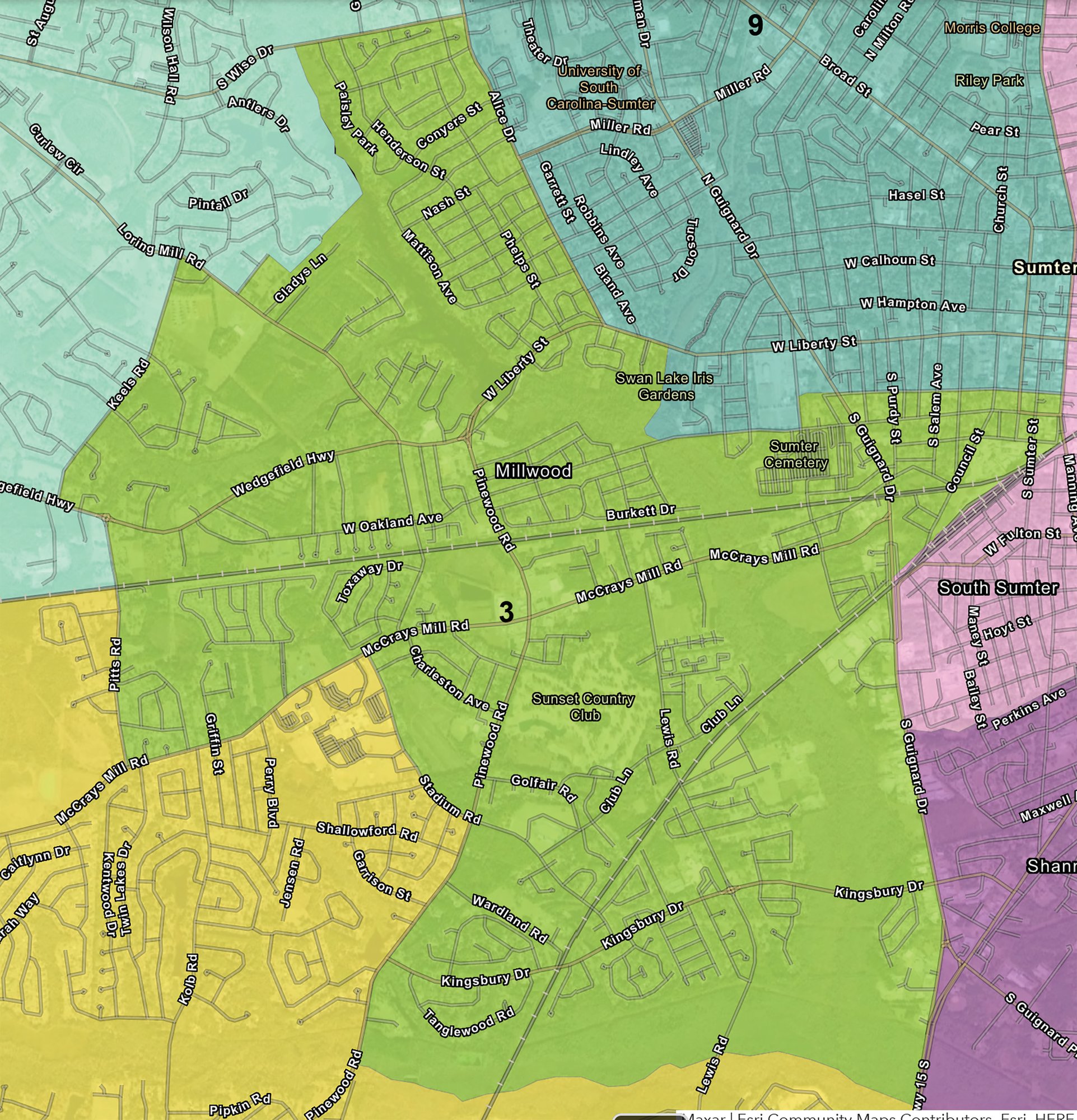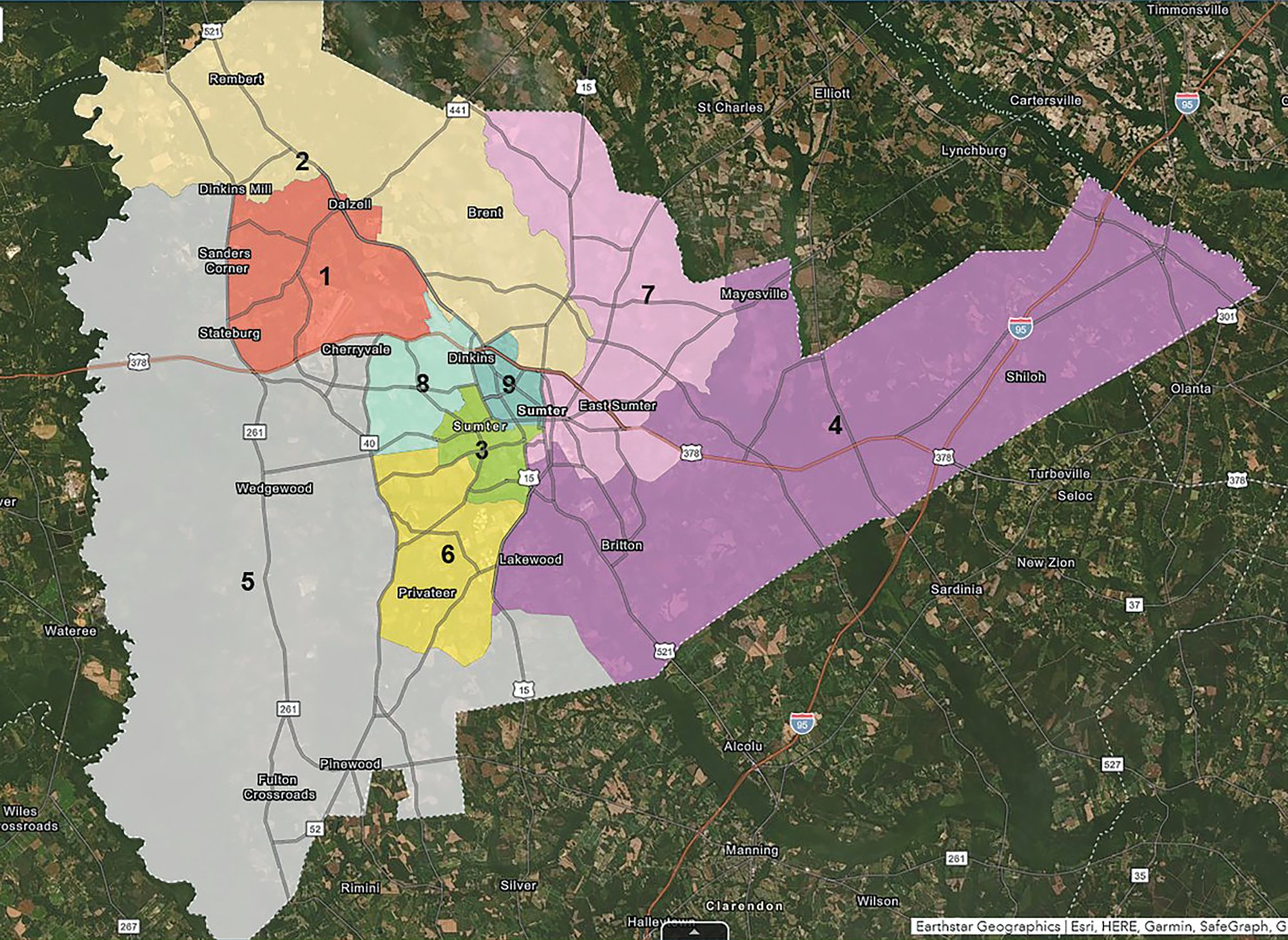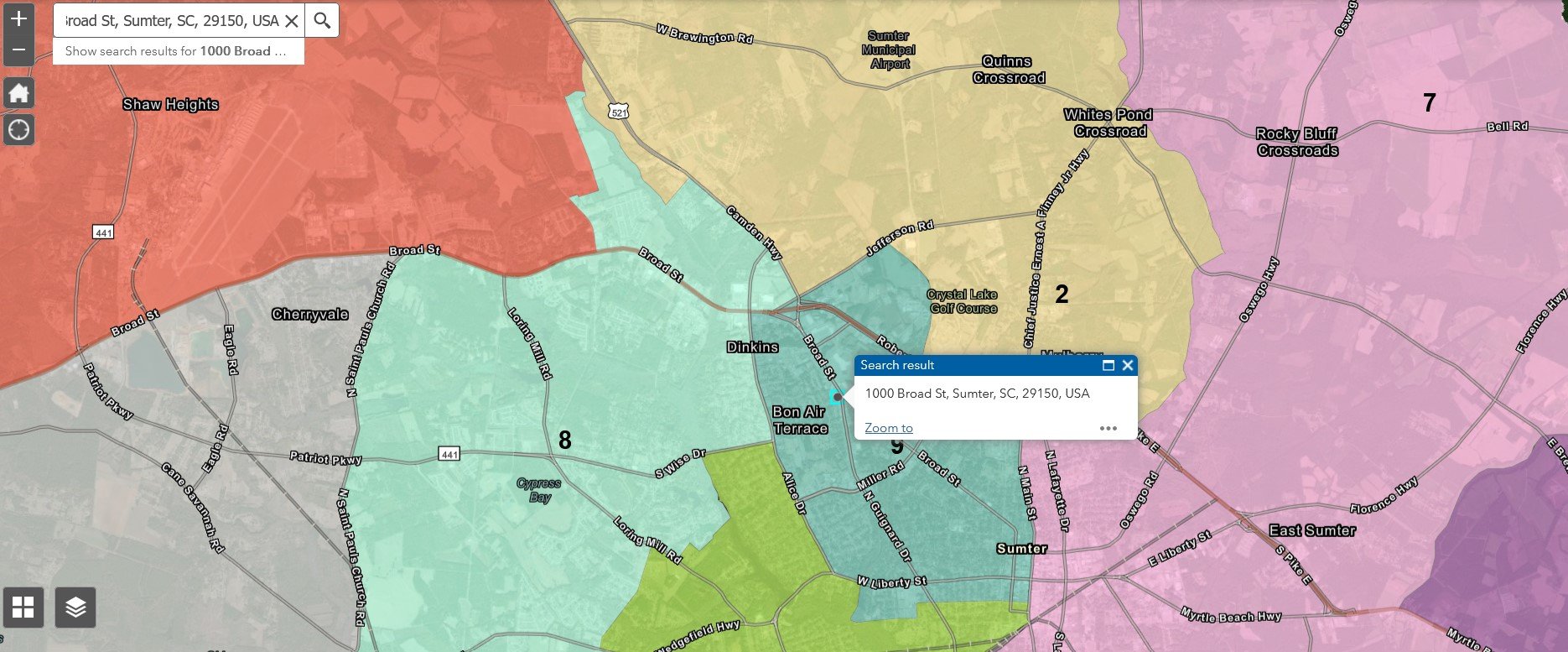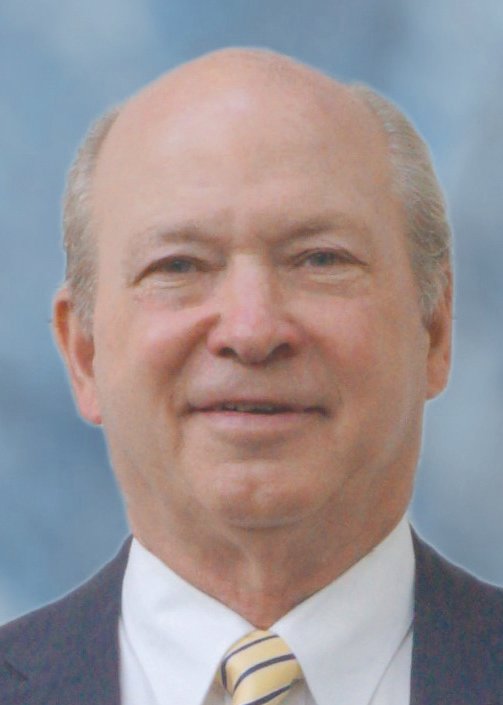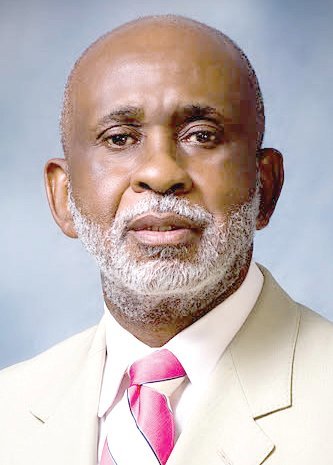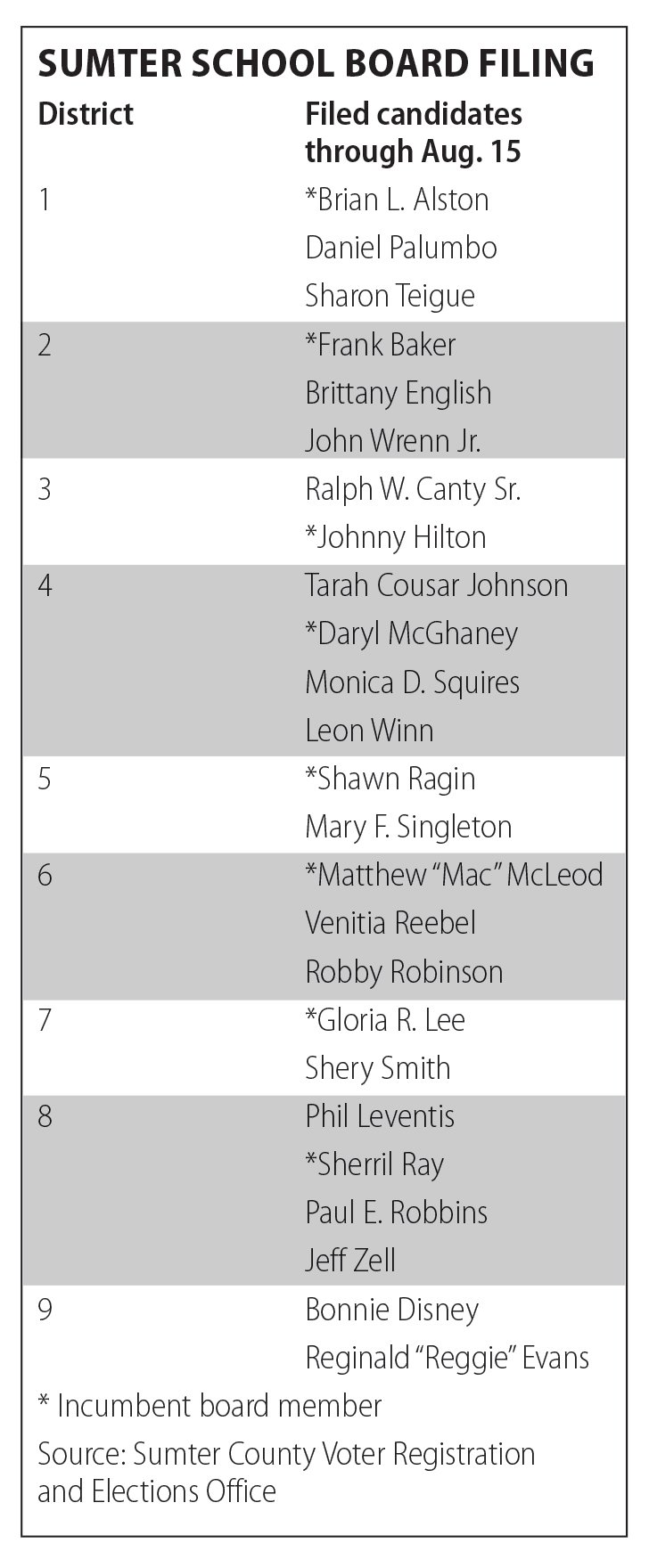Sumter School District Area 3 school board incumbent faces challenge from previous member
To see in which of the nine new school board districts you live, go to sumterschools.net and click on the board link at the top of page and then click on "New School Board Areas."
The interactive map will then display and a spy glass tool near the top of the map allows residents to simply type in their home address and see which board member's district they live in and can therefore vote for.
Actions by the majority of the current, nine-member Sumter School District Board of Trustees influenced these conditions since the November 2018 election. The majority of the board does not reflect all nine members, however. During their service on the board, incumbent Johnny Hilton and former trustee Ralph Canty were in general against these actions. They were the minority on these issues.
* Passed on a fully-funded, new district high school technology center on Broad Street
* Violated the district's financial recovery plan by voting to reopen a school that was closed and consolidated into a nearby school by the previous board in April 2018. State superintendent placed district on "Fiscal Emergency" status for action.
* 136.5 teacher vacancies at end of last school year (14.4% of teacher count)
* On its second superintendent. Let previous leader go after unanimously naming her in 2019.
* Earned 2 mills of support from Sumter County Council. Was turned down for more than 10 additional mills.
* Closed no schools after 11.3% drop in enrollment since 2017. Instead, rezoned attendance lines for students to balance facility utilization.
* Removed the public from standing committees without public notice in 2021.
* An independent, local group established a public charter school (330 current students). Ultimate plan is for 2,000 students.
Compiled by The Sumter Item (2018-present)
bruce@theitem.com
EDITOR'S NOTE: This is the fourth in a series on the nine Sumter school board district seats that are up for election in November. Each week leading up to Election Day, The Sumter Item will analyze a district (alternatively called area) race and interview candidates on the ballot. All candidates will be contacted. Online, this series, like other election information, will be free to read as a public service.
Candidate Q&As in their own words are included in our Vote 2022 Guide that was published in the Oct. 1-3 Weekend edition.
- - -
Another week closer to Election Day, and many community stakeholders still stay it is the most important election in Sumter this year.
All nine seats on Sumter School District's Board of Trustees are on the ballot. This week, we venture back into the City of Sumter to look at the new District 3 race.
After the school district's financial crisis became apparent in late 2016, the Sumter County Legislative Delegation added two seats to the seven-member school board in 2017. The delegation's purpose then in creating the new "at-large" county seats on the board was to bring additional focus and expertise to remedy the district's challenge.
Without an election that year, the delegation appointed the two trustees to the board, expanding it to nine members. In November 2018, these new at-large seats went up for the public's vote for the first time. Being at-large seats, every voter in Sumter County saw the race on the ballot, and the top two vote-getters won the seats.
The delegation specified in the original legislation that after 2020 U.S. Census redistricting to account for population shifts, the school board would switch to nine single-member districts for the 2022 election and moving forward. This spring, the delegation had General Assembly staff members who handled state redistricting also reconfigure Sumter County's seven districts into nine. Law requires electoral districts to encompass equal populations in each.
That means while you may not have moved since the last election, you may vote in a different district than before. Voters can research sample ballots online at scvotes.gov or learn more in The Sumter Item's Vote 2022 special guide that published on Oct. 1. All Sumter County voters should also receive a new voter registration card detailing their districts.
The financial challenges of 2016-17 are resolved now largely because of the work of district staff and administration as well as attrition. After recording a net loss of $4.3 million in 2016, depleting the district's general fund balance to $106,449, the district notched gains every year since and ended 2021 with $32.6 million in its bank account. This fiscal year's audit will be released in December.
Meanwhile, the board that took over in late 2018 - which includes the superintendent who was in charge in 2016 before he retired in 2017 then won an at-large seat - has been often controversial because of its own actions and internal divisions.
Those started with voting to reopen a closed school and subsequently the state superintendent of education declaring a "fiscal emergency" in the district in spring 2019. More recently, the board voted 5-4 to remove the last district superintendent after unanimously naming her to the post three years earlier. The vote appeared to violate Penelope Martin-Knox's contract that required her termination to be approved by a supermajority, which would have been six votes. A judge also found the vote was illegal because the surprise motion was not on the agenda, meaning it violated the Freedom of Information Act, a situation revealed by reporting in The Sumter Item.
Special interests tend to dominate the board's activity and conversations over policy and student and staff achievement and wellness, even while public education faces increased competition in recent years with growing educational options available to parents and families. Add onto that a nationwide teacher shortage.
That all sets the stage for the upcoming election.
- - -
THE DISTRICT 3 RACE
The new District 3, also referred to as Area 3, generally contains the western suburbs in the City of Sumter. Western boundaries include Pinewood Road, McCrays Mill Road extending to Pitts Road and also Keels Road. The Cane Savannah Creek area below Kingsbury Drive is the southern boundary. A northern tip to District 3 includes the Alice Drive/Wise Drive intersection in town. An eastern boundary is South Guignard Drive before the district converges onto the downtown area along Oakland Avenue.
Two candidates filed for the seat and are in the race: incumbent Johnny Hilton and challenger Ralph Canty, who was previously a board member and chairman and also a state lawmaker for Sumter in the 1990s.
Hilton and Canty are similar candidates and were close allies for several years on numerous board topics before Canty decided not to seek re-election in November 2020. Their voting records as trustees were similar, and their platforms for this election also seem similar.
The two men were often in the minority after the November 2018 election saw five new trustees come onto the board in Frank Baker, Brian Alston, Sherril Ray, Matthew "Mac" McLeod and Shawn Ragin.
Some controversial board votes from 2018-20 were 7-2 with Hilton and Canty as the only opposition, including the February 2019 vote to appeal state Superintendent Molly Spearman's fiscal emergency declaration on the district to the South Carolina Board of Education. Spearman placed the district on fiscal emergency after the board majority voted to reopen Mayewood Middle School in early 2019, an action that violated the district's own financial recovery plan after the overspending in 2016. Canty and Hilton were also in the minority against reopening Mayewood.
They were also both part of the previous board that in April 2018 made the 5-3 vote to close Mayewood and F.J. DeLaine Elementary School because of historically declining enrollment and in an effort to save money in the financial recovery. Both voted to close the schools.
In the appeal process in 2019, the state board ultimately ruled unanimously in favor of Spearman to keep the two schools closed, and they have remained closed since then.
After Canty did not seek re-election, newcomer Gloria Lee won his area seat.
JOHNNY HILTON
In the last four years with the vast majority of the current board members, Hilton has separated himself with his voting record on several controversial issues. Votes of 8-1 on issues have occurred since 2020, including when the trustees removed the public from standing committees last year without public notice.
A Sumter native, Hilton also stood alone against changing schools' attendance lines from the beginning of the district realignment study in 2021. He maintained his opposition throughout the months-long project that was led by a third-party consultant and the board's Transportation Study Ad-Hoc Committee (aka realignment committee). Three other trustees did eventually join him in the split 5-4 vote that passed realignment in April.
He said too many students and teachers will be moved in the current realignment plan that will go into effect next school year, and it will have a negative impact. Hilton added some tweaks involving attendance lines are needed in the district, but not to the extent that is planned, and revisiting realignment is necessary.
A lifelong educator, Hilton served 43 years in public education, 34 in Sumter County. He was principal of Millwood Elementary School for 25 years to close his professional career.
In his retirement, he is a part-time farmer and engaged in community activities including serving on the board.
He thinks his experience as an educator and community affiliations help when serving in public office to make things better for children in Sumter County.
Hilton's political experience is his eight years on the school board. In 2014, he defeated incumbent Keith Schultz, and in 2018, Hilton ran unopposed.
As far as challenges in the district, he noted student achievement because of the COVID-19 pandemic and how long the district was in virtual learning with students at home. Hilton was opposed to the length of time that district students were not in face-to-face instruction in the 2020-21 school year, according to The Item's FOIA research from earlier this year of board members' emails to the superintendent. Sumter was one of the final districts in the state to return to in-person learning that school year.
Teacher recruitment and retention is another challenge and also student behavior, he added.
Students need to be held accountable for their actions and the district's expectations for student behavior need to be raised, Hilton said. Additionally, the full board needs to raise its own standards.
"We need to hold ourselves to a higher standard," he said, "and when I say ourselves, I mean the board members and the administration. We need to raise our expectations for ourselves, and that carries over. People most often respond to the leadership's expectations. If the leadership has high expectations, then people generally will try to meet those expectations, and that could be part of our image problem. Somehow, we seem to have lowered our expectations as a district from an academic standpoint and from a student behavior standpoint, and we need to be aware that high expectations are essential for student success."
The district does have successes to build on, including its science, technology, engineering and math (STEM) programs and its International Baccalaureate and Advanced Placement programs.
Hilton was also for a "technical high school" concept in conjunction with Central Carolina Technical College's Advanced Manufacturing Technology Training Center on Broad Street that would have had $10 million or more in state funding attached to it. With five new board members after the November 2018 election, that high school or center "dropped off the agenda, so to speak," Hilton said.
School districts in Richland and Kershaw counties have state-of-the-art facilities in this focus area and Sumter needs the same, he said.
Hilton added, through working with the various stakeholders, the whole Sumter community needs a better vision for public education to help move the community forward and improve its image.
Regarding former Superintendent Penelope Martin-Knox, Hilton voted against extending her contract last school year, but he said he is not allowed - per a legal agreement - to say anything about her.
RALPH CANTY
As stated previously, Canty and Hilton were allies on the board for several years before Canty decided not to seek re-election two years ago.
A bivocational pastor and owner of two funeral homes in Sumter, Canty served nine years from 2011 to 2020 on the consolidated district's board and a few years before that on the former Sumter School District 17 board for about 12 years total, he said.
Why does he want to come back on the board again?
Canty said once the trustees unanimously elected Martin-Knox as superintendent in 2019, he thought the district would make progress under her leadership and with the board's support. Instead, the district has not grown and has less community involvement, he said. Canty added he does not think he can solve all the district's challenges by himself.
"To be perfectly honest," he said, "while I don't consider myself a savior, I think the board needs someone at this point with leadership, with vision and with the courage to bring this community together so that the school district will become a prize that we all will be proud of. My love for the children, my love for education, my love for this community call me to enlist again for service."
Canty added he thinks he has the experience, knowledge, passion and willingness to make sacrifices in joining others to create a "world-class school system" here in Sumter. He also said he has been a longtime advocate for people in the community and quality of life locally.
On the initial board in 2011, Canty did support the naming of Randy Bynum as the first superintendent in a 5-2 vote among the seven-member board at the time.
He said Bynum's leadership concept brought accountability at all levels in the district. In its initial years, the district also hired a top chief financial officer in Steve Mann, Canty added.
Bynum would serve two tumultuous years as superintendent before resigning in 2013.
Former longtime Sumter School District 2 Superintendent Frank Baker immediately stepped in as the interim leader. Then a few months later, in a 4-3 vote, Baker was named the district's full-time superintendent. Canty was against installing Baker as the district leader and said it "further polarized the system" of District 2 versus District 17 that existed before consolidation.
Baker would be superintendent for about 3.5 years before retiring after the district's financial crisis in 2016-17.
As far as challenges in the district, Canty - like Hilton - also indicated student discipline as a priority.
"We have a serious, serious problem with discipline in the district," Canty said. "We are not going to be able to rebrand this district until we can get control of the discipline problem."
A commitment to a level of excellence is also needed for the district to perform well against Liberty STEAM Charter School and area private schools.
If he were elected again, Canty said, he would also be an advocate for putting public participation back on the board's committees.
The board has contributed to the district's move backward by not supporting Martin-Knox and her vision and not working for unity among themselves, he said.
Additionally, board members have held onto personal interests.
"Everything that we do should lead to a more excellent education for the children," Canty said, "and I think the present board has failed us in these areas and others."
More Articles to Read

